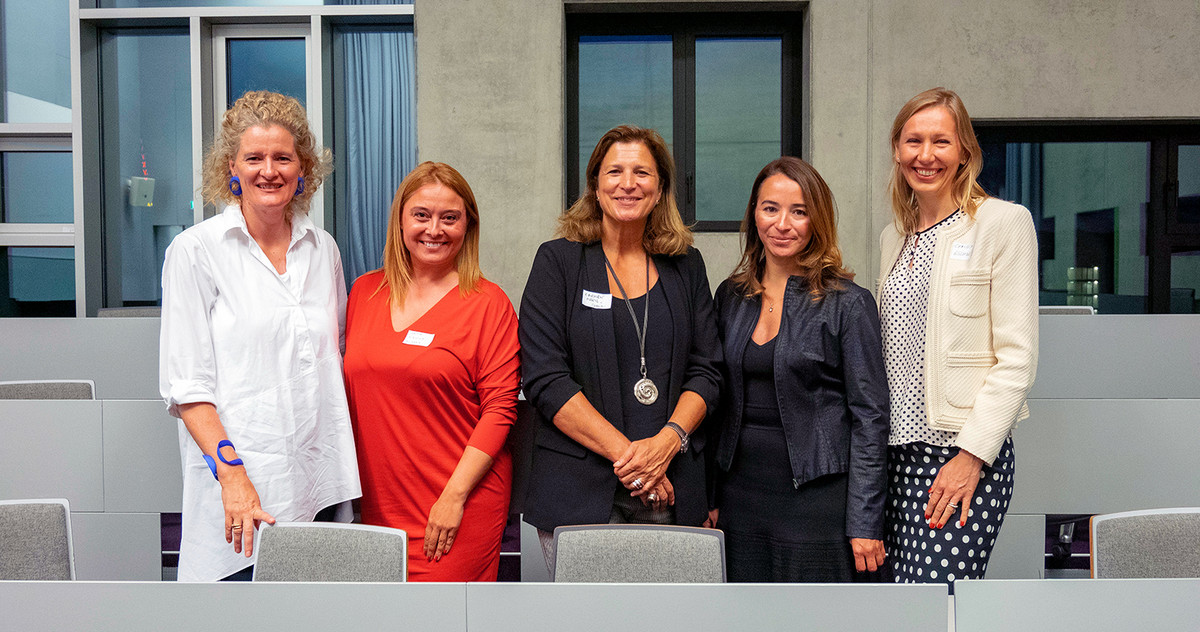Overview
Recommendations
Next Steps
Social media
Sustainability in Business: Paths to a Green Future
What do we actually mean when we talk about sustainability? For companies, this has long since become a crucial question that is getting increasingly difficult to answer. Growing demands and expectations from stakeholders make it clear that sustainability is no longer just an ethical obligation, but a strategic necessity. Companies are therefore faced with the challenge of anchoring sustainability as an integral part of their strategy. Preferably as part of a holistic approach that takes equal account of economic, ecological and social aspects.
As experts in the field of sustainability, we not only offer strategic support in the implementation of your sustainability strategy. We also provide comprehensive training opportunities. Our aim is to raise awareness of the importance and potential of a sustainable economy. Our focus lies on knowledge exchange, innovative processes and inspiring initiatives to create a sustainable basis for life. Through in-depth analyses, current research findings and practical examples, we want to encourage companies and society to consolidate sustainable action.
Economic sustainability means promoting a way of doing business that is viable for the long run and does not focus on short-term profits. It should rather ensure the preservation of natural resources while taking environmental and social aspects into account. This includes promoting fair trade, supporting local communities and taking environmental and social costs into consideration when making economic decisions. Weighing up ecological and economic relevance is essential for this.
We firmly believe that following the principle of sustainability is both an ethical obligation and an economic necessity. By using our resources responsibly, we can both protect our environment and contribute to a fair society and preserve it for future generations. With our part-time study programs such as the Executive MBA Energy Management, the Master Sustainability, Entrepreneurship & Technology and the ESG & Sustainability program, the WU Executive Academy actively contributes to bringing about a positive change towards a sustainable society.
On our website you will find a variety of articles, interviews and practical tips to help you align your personal and corporate goals with a sustainable strategy. Take a look at our latest news articles on sustainability right here, or scroll down, where we explain the key terms related to economic sustainability and offer support for your journey towards sustainability. From reducing your ecological footprint to implementing environmentally friendly business practices.
Meet Our Alumni SDG Leaders
Together with other Global Executive MBA graduates, Anita Kirilova, Deputy CEO of the global insurance services provider Metlife in Bulgaria, has founded the Female Leaders Network at the WU Executive Academy. For women by women – but not against men.

“The little grassroots-people can change this world.” That’s a quote by Wangari Maathai, who was Kenya’s deputy environment minister and received the Nobel Peace Prize in 2004 for her struggle for democracy and environmental protection. It also perfectly applies to people like Anita Kirilova. The Bulgarian Deputy Country Manager of Metlife, a global insurance and finance services provider, is not only a passionate leader but also co-initiator of the Female Leaders Network (FLN) at the WU Executive Academy and the driving force behind this women’s network.
When she completed her Global Executive MBA program between 2017 and 2018, she met other female leaders and soon realized something. “Even though we came from very different countries in Europe and Asia and the US, we all shared this fundamentally female experience of struggling with our work-life balance, juggling challenging jobs and our families, and solving leadership and team development challenges. These are all experiences that particularly women make while pursuing their careers.” Some of her fellow students became close friends of hers. Again and again, they discussed the importance of providing women with a safe space for exchanging the personal experiences that come with their double role as women and leaders.

Anita Kirilova
It was important to us to create a space of mutual trust in which female students and graduates of the WU Executive Academy would support each other.
The initial spark for the grassroot initiative ultimately came from one of our International MBA Residencies at the Carlson School of Management of the University of Minnesota: our partner university invited the MBA students of the WU Executive Academy together with Chinese students to attend this event that also included a “Female Lunch.” “During this lunch, we talked to students from the US and China, also discussing the idea of applying this best-practice example provided by the University of Minnesota to the WU Executive Academy,” she remembers.
Together with some of her fellow MBA students, among them Priyanka Dutta-Passecker, Christa Gschweitl, Özlem Şensin, Anita Kirilova decided to establish a female network at the WU Executive Academy. The first step was to present the idea to WU Executive Academy Dean Barbara Stöttinger and get her approval: “Barbara Stöttinger gave us her full support right from the start,” Anita Kirilova says.
Soon, the network started to take shape: “We invited two experts, who have long been passionate about the topic, Barbara Stöttinger and Carmen Abril, marketing expert at IE Business School in Madrid, to become our patronesses and participate in our first Female Leaders Network event, which took place as soon as in September 2018.” The network grew fast; they appointed a president, a vice-president, and a board.
In 2020, the first year of the pandemic, Anita Kirilova came up with another idea: “It would be great to keep a close connection to fellow students even after graduation, especially if you are not in Vienna, to keep the network alive - especially during the pandemic,” she says. So she initiated the first regional Female Leaders Network Hub in her home town of Sofia, where she organized regional events for the Bulgarian graduates. This idea quickly spread to other regions, and further hubs were established in the Czech Republic, Slovakia, and other countries. “We identified interested graduates who were willing to establish a hub in their regions. It was easy to find motivated women who were willing to put in some voluntary work,” Kirilova shares. “What is important, though, is a powerful, good organization, a venue for events, and some marketing know-how to advertise them,” she adds. “As everyone’s lives are changing fast, we decided to elect the members of the bodies annually; this also gives other women a chance to become involved in the Board’s work.” In the meantime, hubs have been in place for about 18 months in Bulgaria, Romania, Croatia, Hungary, and a cross-country one in Slovakia and the Czech Republic. There is also a very active virtual network that counts more than 1500 members worldwide who come together time and again at the WU Executive Academy to meet in person.

Gender equality is still an important topic. “Strong female leaders need the support of like-minded persons in both their professional and their private lives,” Kirilova says, because “female leaders tend to be faced with other challenges than men. They want to talk about the compatibility of careers and families, work-life balance, efficient team work, and cooperation.”
The Female Leaders Network is intended as a safe space for an exchange on specifically female topics, but it is also more than that: Anita Kirilova is convinced that mutual female empowerment makes change happen. She also shares an example with us: “Imagine a woman in a company. She is scheduled to go on a business trip on December, 20th. She would rather spend time with her family and on Christmas preparations, though. If she’s on her own, it’ll be difficult for her to change things. If there’s a whole group of women in the company who are all against business trips shortly before Christmas, they’ll have the leverage to change the rules in the company – that were established by men.”
The passionate leader and networker underlines that it’s definitely not a question of either-or. “Including men in their professional networks is, of course, very important for women and their careers. Women need the support of both men and women,” Anita Kirilova emphasizes.
Click to learn more about the Sustainable Development Goals.
More exciting stories from our alumni and how they are working to achieve the Sustainable Development Goals through their careers.
Strategic sustainability management is a systematic approach that ensures that sustainability goals are firmly anchored in the corporate strategy. Based on an analysis, the sustainability aspects relevant to the company are determined and measures are developed to minimize environmental, economic, and social impacts. This enables companies not only to meet regulatory requirements, but also to assume responsibility in terms of social sustainability. It also ensures long-term competitiveness.
Strategic sustainability management is of central importance for companies for several reasons. It lays the foundation for environmentally friendly business practices by helping them to use resources more efficiently in the long term.
Acting in an economically sustainable manner means making forward-looking decisions. This helps to keep expenditure in check and make the most of the available budget. Acting in an environmentally conscious manner means avoiding, reducing or offsetting measures that have a harmful impact on the environment.
At the same time, implementing effective sustainability management enables companies to meet rising expectations of customers, investors and other stakeholders.
Corporate Social Responsibility (CSR) is fundamentally based on the awareness that companies have a social responsibility and must act accordingly in the interests of a sustainable economy. In 2011, a strategy on social responsibility was published by the European Commission for the first time. It is based on the intention of creating good conditions for sustainable growth and responsible business. Therefore it identifies areas for action and provides guidance on how CSR can be implemented in existing concepts and corporate strategies.
In this respect, CSR pursues a principle of action. According to this, companies - over and above political objectives - voluntarily integrate ecological and social measures into their business activities and in cooperation with stakeholders. This includes, for example, the implementation of or participation in projects to protect our ecosystem. Philanthropic activities such as donations to charitable organizations and youth development or support for local community projects also fall under the term CSR. Furthermore, companies can fulfill their social responsibility by creating fairly paid jobs, safeguarding employee rights and promoting diversity and inclusion in the workplace.
CSR has become particularly important as companies are increasingly judged on what they do for society including the environment - and what commitment they make. Even if the implementation of CSR measures is voluntary, these measures are now taken for granted in the context of social responsibility and have a significant impact on a company's reputation.
In this context, the question arises as to how social responsibility and sustainable business practices can be implemented. An effective sustainability strategy could, for example, be based on the principles of ESG. But what exactly is behind the buzzword "ESG"?
ESG stands for Environmental, Social and Governance. These three key aspects (also known as the "three dimensions" of sustainability) enable a holistic assessment of companies. They are ensuring that economic success is not achieved at the expense of environmental protection, social justice and ethical standards. Taking ESG criteria into account is therefore crucial to ensure long-term growth and resilience. It also helps to meet the expectations of various stakeholders.
Below are some examples of how sustainable companies specifically integrate ESG principles into their organizational strategy:
Environmental: Responsible use of raw materials, use of renewable energy, reduction of emissions, economic and sustainable travel, protection of natural habitats
Social: promotion of healthy working conditions, diversity and inclusion, social commitment, product responsibility
Governance: transparency in decision-making processes, compliance with ethical principles, integrity, protection of human rights, avoidance of exploitation, appointment of a money laundering and compliance officer, risk management, supplier selection
In 2015 and as part of the 2030 Agenda for Sustainable Development, the United Nations agreed on the Sustainable Development Goals (SDGs). These can be seen as a universal call to end poverty, protect the planet and ensure prosperity at an international level.
The SDGs provide a comprehensive framework for promoting economic sustainability by setting indicators for sustainable development with a total of 17 development goals and 169 targets. Companies can contribute to achieving the SDGs by aligning their business processes with these targets, e.g. by investing in clean energy technologies and sustainable infrastructure to combat the climate crisis (SDG 13 - Climate action).
Protecting the environment and climate is a task not only for companies, but also for the world of finance. The term "green finance" established in this context refers to investments in environmentally friendly projects and companies that help to reduce environmental pollution and promote a sustainable future. Green financial instruments such as green bonds and sustainable investment funds enable investors to invest in climate-friendly and sustainable projects while generating financial returns.
Companies, on the other hand, can raise capital for green investments by issuing green bonds. And thereby demonstrating their commitment to environmental sustainability. Governments, meanwhile, have the opportunity to use green financing through policy measures (e.g. tax incentives, subsidy programs). They can encourage investments in environmentally friendly projects and accelerate the transition to a low-carbon economy.
In order for companies to implement a successful sustainability strategy, they need managers who cultivate a responsible management style and act in a value- and sustainability-oriented manner. Responsible leadership should therefore also be understood in particular as providing impetus for communication and interaction. It is questioning company processes and examining and, if necessary, modifying their ethical, economic and sustainable principles. Decisions should be made in the interests of a sustainable future, away from short-term financial success and towards corporate social responsibility.
The term responsible leadership therefore primarily refers to the ethical and long-term oriented actions of managers and decision-makers in companies that aim to achieve economic success without jeopardizing resources. This means that companies not only strive for short-term profit maximization, but also include social and environmental impacts in their decisions. Responsible managers strive for a balance between financial goals, environmental protection, and social responsibility. This approach is important to develop long-term stable and sustainable business models that serve the interests of both the company and society as a whole. It helps to strengthen stakeholder trust, improve the company's reputation, and create long-term value.
In the context of "sustainability", there is no getting around the energy transition. The term "energy transition" refers to the transition from fossil fuels to renewable energy sources in order to ensure stability in the energy supply in the future. This transition aims to reduce dependence on limited and environmentally harmful resources while creating new opportunities for growth and employment. By promoting renewable energy, companies can benefit from stable and affordable energy prices while reducing environmental impacts and dependence on volatile energy markets. The energy transition is therefore a decisive step towards a sustainable and future-oriented economy and society that combines ecological, social and economic aspects.
The need for sustainable development is indispensable. It has to satisfy the needs of society without jeopardizing the needs of future generations ("justice for grandchildren") and it has to focus on the protection of natural resources. The first measures, plans and regulations have already been launched. Companies are addressing the issue of sustainability voluntarily or by decree, as well as realigning corporate goals and strategic processes.
The future of an environmental economy is characterized by a profound change in the way companies operate and create value. It encompasses a range of innovative approaches aimed at placing the concept of sustainability at the heart of economic decision-making. This includes the increased use of renewable resources, the promotion of circular production and the integration of environmentally friendly technologies and practices along the entire value chain. An ecological economy of the future not only strives for short-term profits, but also takes into account long-term environmental goals and the well-being of future generations. The urgency of this transformation lies in the need to meet the challenges of climate change and ecological degradation and to ensure a sustainable future.